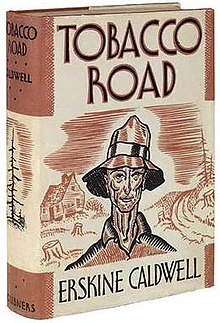
Nathaniel Rich writes on The Daily Beast
website, "As a comedy, Tobacco Road is a modest failure; as a tragedy,
it is an abject failure" and that the novel is "as indelible as a
freak show or car crash." Dwight
Garner on the Slate website called it "a greasy hairball of a
novel....one of the sickest and most lurid books to have emerged from the
literature of the American South."
Both writers, however, proceed to give the novel a generally positive
review. Their conflicted response is
typical of both critics and readers.
Experts, however, have ranked it as one of the hundred most
significant novels written in English in the 20th century. And, especially after its success as a
Broadway play, the novel eventually sold ten million copies.
Rich goes on to say that Erskine Caldwell is a
"progenitor of what could be called the degenerate school of American
fiction," which I suppose could be called a subgenre of the so-called
grit-lit genre. At any rate, it seems
that a straight line can be drawn from Caldwell to writers such as Harry Crews,
who also attempted to combine tragedy and comedy in their novels.
Tobacco Road, published in 1932, was meant to be
a work of social protest, a condemnation of poverty among the poor whites of
the Deep South. John Steinbeck wrote
about some of the same issues a few years later in The Grapes of
Wrath. But it is only on the
surface that the two books are similar. Unlike Steinbeck, Caldwell refused to resort
to sentimentality or to imbue his characters with any degree of dignity in
coping with their suffering. Other than
poverty and being dispossessed of their land, Caldwell's Lesters share very
little in common with Steinbeck's Joads.
Most readers, and I include myself, struggle with Caldwell's
depiction of the Lesters as being "ignorant, selfish, crude, sexually
promiscuous, indecent, but also comic figures." Caldwell seems to simultaneously sympathize
with his characters while at the same time maintaining a disdainful attitude toward
them. It is call for social action to
combat poverty, but one that provides no solutions to the problem.
Caldwell claimed that he wrote the novel as "a rebuke
of the perfumed 'moonlight and magnolias' literature of the South." Well, it was that.
And there is this, too: it was edited by Maxwell Perkins;
William Faulkner and Malcolm Cowley admired the book; and Saul Bellow thought
Caldwell should have been awarded the Nobel Prize.
No comments:
Post a Comment